Westward Housing, Peacock Place
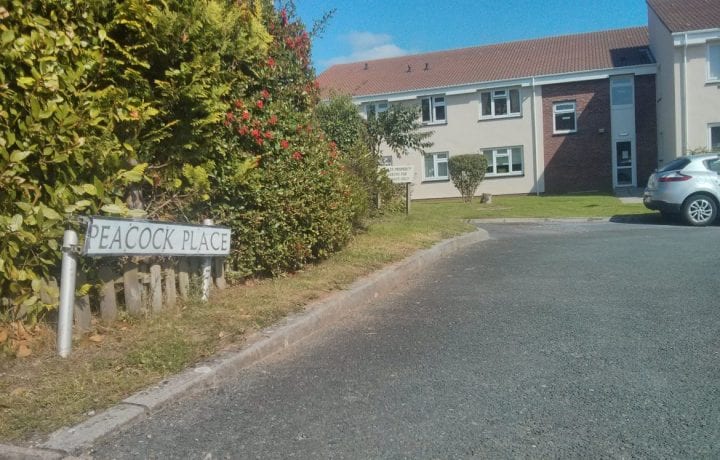
Ground Source Review: Peacock Place.
Peacock Place is the third award-winning ground source heat pump retrofit project undertaken by Westward Housing and Kensa Heat Pumps, installed in sheltered accommodation housing vulnerable residents in a block of flats in East Devon.
- Winner: Sustainable Project of the Year (HVR Awards 2016)
- Winner: Large Scale Project SW Region (Energy Efficiency & Retrofit Awards 2016)
Ground Source Review: Peacock Place
In February 2015, Kensa Heat Pumps and Westward Housing partnered to deliver the UK’s first micro-district ground source heat network scheme in flats for residents at Croft House in Holsworthy, Devon. Westward Housing were so impressed with the results that they committed to two further ground source heat pump projects with Kensa; Peacock Place is the third retrofit installation to take place in the last 18 months.
Peacock Place provides sheltered accommodation for vulnerable elderly and disabled residents, comprising of 24 one and two bedroom flats plus a guest bedroom linked by a communal corridor and a breakout area. The whole site was originally heated by night store heaters supplied by an economy 7 tariff, which was an inefficient and expensive system to run. Following the successes of previous projects, Westward Housing were keen to implement a more affordable and sustainable ground source heat pump solution.
Kensa carried out extensive survey work and heat loss calculations before specifying a micro district ground source heat network solution. This innovative system architecture, pioneered by Kensa, features an individual ground source heat pump in each flat linked to a communal ground array. The flats at Peacock Place are served in groups of two with a shared single borehole between them, with additional boreholes for the communal corridors, breakout area and guest bedroom respectively.
This communal approach reduced drilling costs and also made the project eligible for the Non Domestic Renewable Heat Incentive (RHI – this scheme has closed), giving Westward Housing the opportunity to receive quarterly payments from the Government for 20 years. It also ensures that each property can use their own preferred energy supplier and pay only for the heat they use, rather than more common communal systems where it becomes necessary to meter for payment which is more complicated for both the landlord and tenant.
To create the micro heat network, 15 boreholes were drilled on site to a maximum depth of 104m. Extensive design and survey work was conducted prior to the drillers arriving on site, with historical borehole logs being consulted along with information from the British Geological Society. Ground conditions were found to be as expected with alluvium and river bed deposits to a depth of 10m at which point the conditions changed to sandstone and mudstone which continued to depth.
The majority of the boreholes were drilled at the back of the block of flats; to facilitate this it was necessary to open up an access road into the grounds of Peacock Place. The installation took place between January and March 2016 and the weather was unusually wet which made ground conditions rather challenging at times. 120m of track mats were laid to reduce impact of heavy drilling machinery on the grounds. Once ground works were completed a careful re-instatement programme began which brought the grounds back to their original condition.
Kensa specified the innovative 6kW Shoebox Twin model for each flat at Peacock Place, which has been proven to deliver excellent results for social housing retrofits due to its low noise output and ability to cope with domestic hot water demand with no need for back up. Local heating engineers RES Devon performed the installation of the ground source heat pumps. The units are small and compact enough to be installed neatly into the tenants’ loft spaces. New radiator systems were then installed into the flats along with a new hot water cylinder designed to be used with the ground source heat pumps.
To heat the communal areas, a further 6kW Kensa Shoebox Twin and a 12kW Kensa Single Compact were specified. Kensa decided to install two heat pumps rather than one larger unit as the communal corridors at Peacock Place run for some distance and the appropriately sized heating pipes needed were deemed to be large and unsightly. The guest bedroom heating requirements are met on the communal system, but are controlled independently as a separate zone to ensure the room can be heated only when necessary, thus saving on electricity costs.
A large portion of the tenants at Peacock Place are elderly with varying levels of mobility and it was often necessary to perform the installations whilst the residents were present in the properties. As such, every effort was made to keep disturbance to a minimum and any moving of furniture was done considerately and replaced carefully. Temporary heaters were provided without fail to ensure no tenants went without heating during the installation. Consideration was also made for residents requiring disabled access to car parks and shared areas. All tenants were fully instructed in the operation of their new system; simple to use controls were installed in the form of a twin channel time clock for heating and hot water with a main heating thermostat for temperature control.
As the installations are eligible for the Non-Domestic Renewable Heat Incentive (RHI – this scheme has closed), it was necessary to install heat and electric metering for periodic data submission. To prevent creating further disturbance by having to visit the properties every quarter to obtain these figures, Kensa installed a remote communications system which sends an email every night detailing the electricity usage and heat production of each of the heat pumps. This is not only beneficial for the funding submission, but also provides a useful way to monitor the efficiency of the systems. It is expected that the RHI (this scheme has closed) will fully reimburse Westward Housing for the capital outlay of the scheme and offer an 11% return over the course of 20 years.
[post_gallery]
Testimonials
Matthew Trewhella, Contract Manager at Kensa Heat Pumps said:
This project required a very fast turnaround and the two month timescale was met through stringent and dedicated project management, and helped by the whole installation service package being provided by us here at Kensa.
We have worked closely with Westward Housing since 2013 having installed 102 ground source heat pump systems across six sites. The success of these installations is due to the support of the Westward Housing staff and the co-operation of their tenants.
Tenants of Peacock Place have so far seen a 25% reduction compared to their last year’s fuel bills. This saving is expected to increase as the heating gets used more in the winter months.
Mrs Long, resident said:
The new system is good, very responsive compared to the old night stores which were expensive to run. I really enjoyed watching the workers, it’s amazing how the heat pumps work.
Mrs Trezise, resident said:
The heat pump is 100% better than the night stores. There was much less disruption than I expected and the team were really nice. I’m only putting £10 on key meter for whole house now. When it’s cold it only takes 20 minutes to heat the whole house – this was impossible with night store heaters.
Mrs McKinnon, resident said:
I never used the night store heaters as they cost too much to run. The installation was great – there were a few teething problems but these were fixed very quickly. If anyone was considering getting a ground source heat pump, I’d say ‘go for it’!

Ground Source Review: Peacock Place - Street View
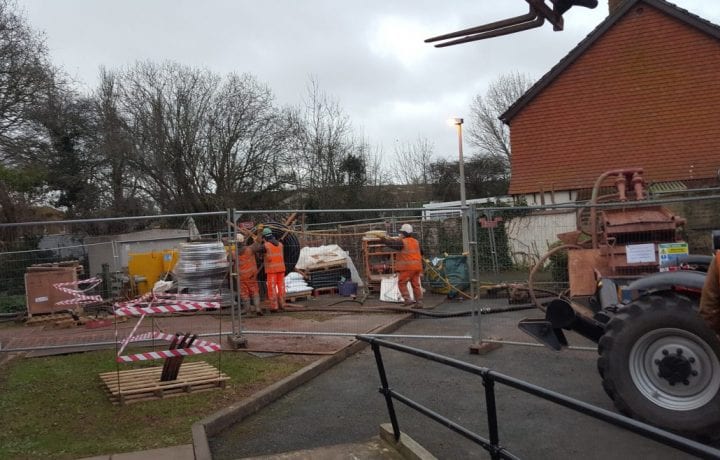
Ground Source Review: Peacock Place - During installations
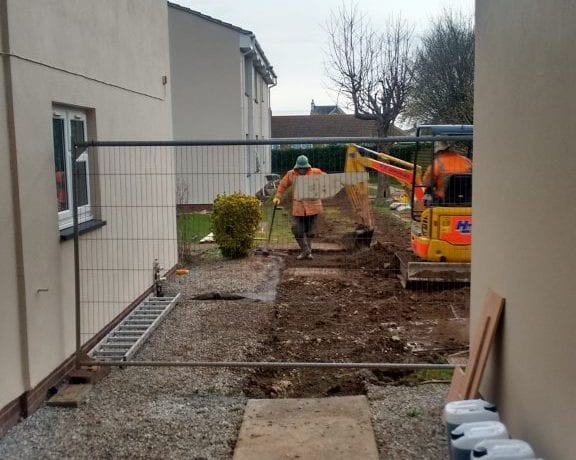
Ground Source Review: Peacock Place Heat Pump - Before
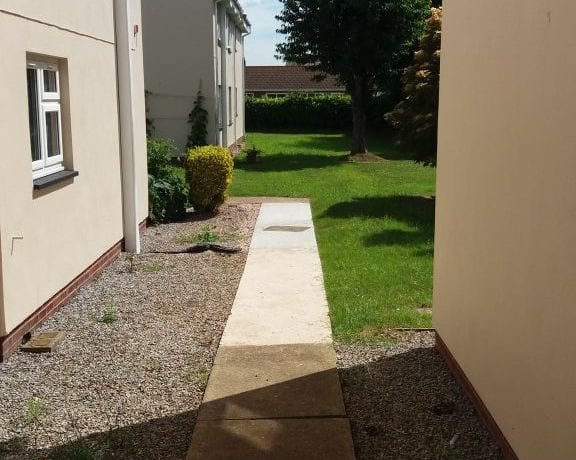
Ground Source Review: Peacock Place Heat Pump - After
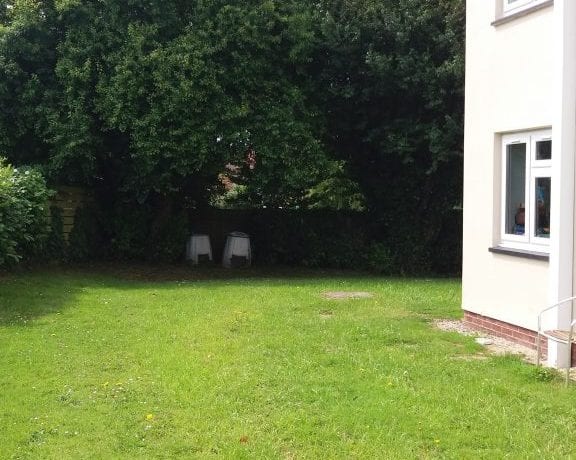
Ground Source Review: Peacock Place Heat Pump - Ground Recovery

